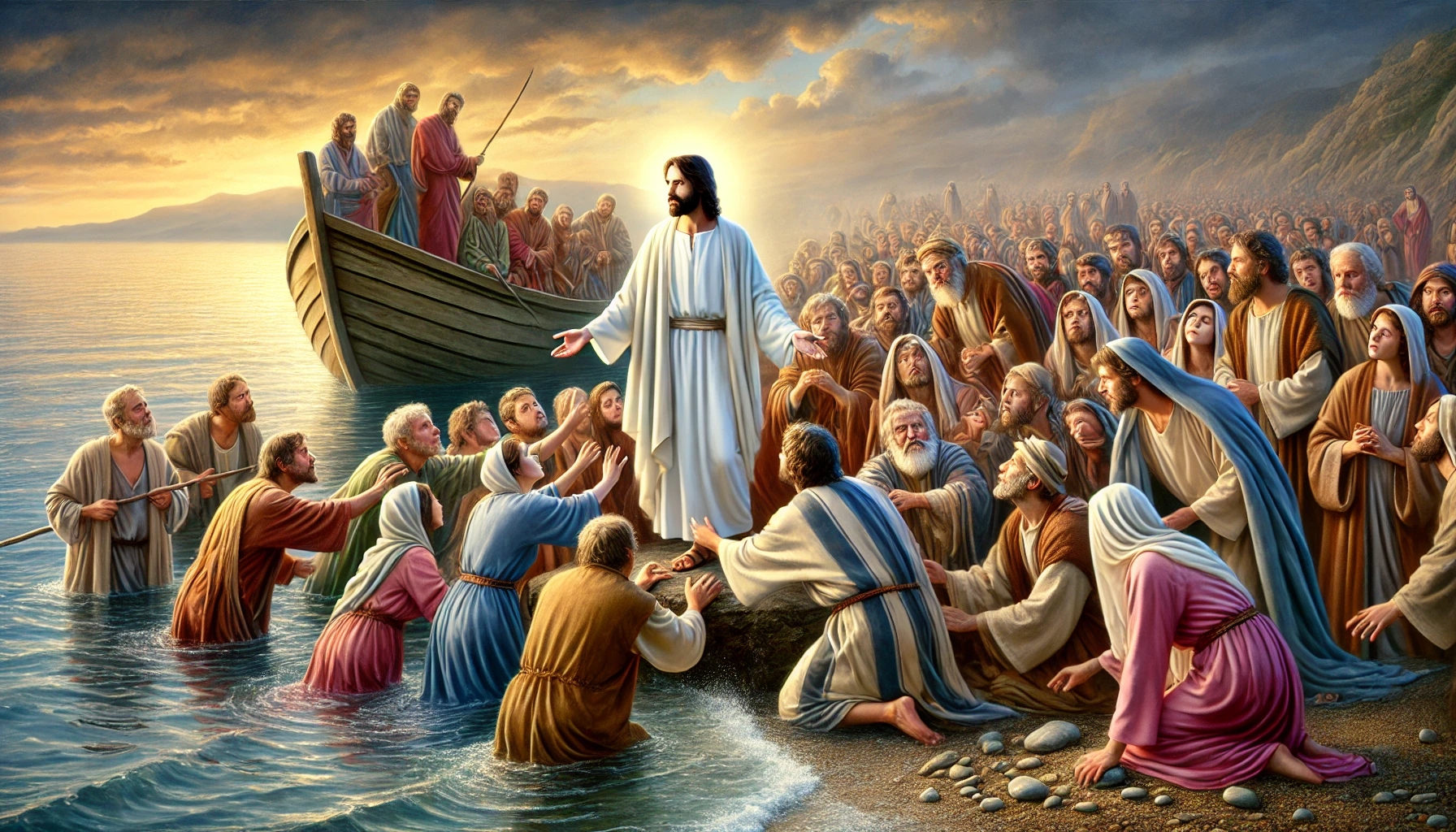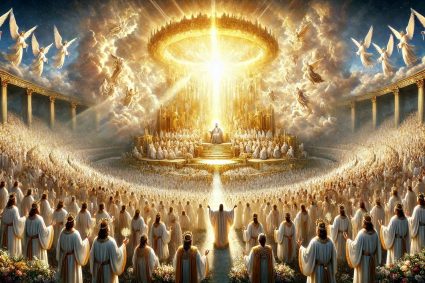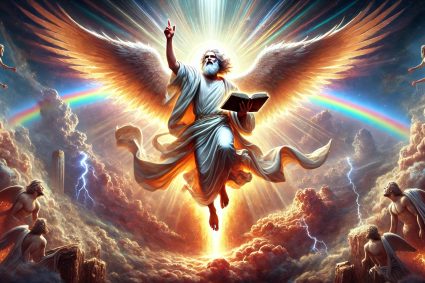
August 30, 2024
DAILY BIBLE READING – Mark Chapter 3
1 And he entered again into the synagogue; and there was a man there which had a withered hand.
2 And they watched him, whether he would heal him on the sabbath day; that they might accuse him.
3 And he saith unto the man which had the withered hand, Stand forth.
4 And he saith unto them, Is it lawful to do good on the sabbath days, or to do evil? to save life, or to kill? But they held their peace.
5 And when he had looked round about on them with anger, being grieved for the hardness of their hearts, he saith unto the man, Stretch forth thine hand. And he stretched it out: and his hand was restored whole as the other.
6 And the Pharisees went forth, and straightway took counsel with the Herodians against him, how they might destroy him.
7 But Jesus withdrew himself with his disciples to the sea: and a great multitude from Galilee followed him, and from Judaea,
8 And from Jerusalem, and from Idumaea, and from beyond Jordan; and they about Tyre and Sidon, a great multitude, when they had heard what great things he did, came unto him.
9 And he spake to his disciples, that a small ship should wait on him because of the multitude, lest they should throng him.
10 For he had healed many; insomuch that they pressed upon him for to touch him, as many as had plagues.
11 And unclean spirits, when they saw him, fell down before him, and cried, saying, Thou art the Son of God.
12 And he straitly charged them that they should not make him known.
13 And he goeth up into a mountain, and calleth unto him whom he would: and they came unto him.
14 And he ordained twelve, that they should be with him, and that he might send them forth to preach,
15 And to have power to heal sicknesses, and to cast out devils:
16 And Simon he surnamed Peter;
17 And James the son of Zebedee, and John the brother of James; and he surnamed them Boanerges, which is, The sons of thunder:
18 And Andrew, and Philip, and Bartholomew, and Matthew, and Thomas, and James the son of Alphaeus, and Thaddaeus, and Simon the Canaanite,
19 And Judas Iscariot, which also betrayed him: and they went into an house.
20 And the multitude cometh together again, so that they could not so much as eat bread.
21 And when his friends heard of it, they went out to lay hold on him: for they said, He is beside himself.
22 And the scribes which came down from Jerusalem said, He hath Beelzebub, and by the prince of the devils casteth he out devils.
23 And he called them unto him, and said unto them in parables, How can Satan cast out Satan?
24 And if a kingdom be divided against itself, that kingdom cannot stand.
25 And if a house be divided against itself, that house cannot stand.
26 And if Satan rise up against himself, and be divided, he cannot stand, but hath an end.
27 No man can enter into a strong man’s house, and spoil his goods, except he will first bind the strong man; and then he will spoil his house.
28 Verily I say unto you, All sins shall be forgiven unto the sons of men, and blasphemies wherewith soever they shall blaspheme:
29 But he that shall blaspheme against the Holy Ghost hath never forgiveness, but is in danger of eternal damnation.
30 Because they said, He hath an unclean spirit.
31 There came then his brethren and his mother, and, standing without, sent unto him, calling him.
32 And the multitude sat about him, and they said unto him, Behold, thy mother and thy brethren without seek for thee.
33 And he answered them, saying, Who is my mother, or my brethren?
34 And he looked round about on them which sat about him, and said, Behold my mother and my brethren!
35 For whosoever shall do the will of God, the same is my brother, and my sister, and mother.
King James Version. Public Domain
Commentary
Introduction
The third chapter of the Gospel of Mark illustrates how Jesus increasingly comes into conflict with the religious authorities of his time. It highlights his tireless efforts to heal people and proclaim the Gospel while facing skepticism and resistance from the Pharisees and scribes. These tensions culminate in a direct confrontation over the interpretation of the Sabbath, the calling of the Twelve Apostles, and Jesus’ defense against the accusation that he casts out demons by the power of Beelzebul. The chapter ends with a remarkable declaration from Jesus about the true nature of his family.
Commentary
The healing of a man on the Sabbath underscores the growing confrontation between Jesus and the Pharisees. Jesus questions the sanctity of the Sabbath by demonstrating that human well-being takes precedence over religious rules. His question, “Is it lawful on the Sabbath to do good or to do harm, to save life or to kill?” exposes the hardness and stubbornness of his opponents, who prefer to cling to their traditions rather than save a human life. Thus, the healing of the man with the withered hand becomes a symbol of Jesus’ prioritization: love and compassion take precedence over legalistic prescriptions.
In the calling of the Twelve, we see how Jesus organizes his mission by choosing his closest followers. These men, some of whom were fishermen or tax collectors, are sent out to proclaim the Kingdom of God and heal the sick. Notably, the granting of new names, such as Simon becoming Peter and the sons of Zebedee being called “Sons of Thunder,” signifies the significant roles these men will play in the early church.
The confrontation with the scribes escalates as they claim Jesus casts out demons by Beelzebul, the prince of demons. Jesus refutes this accusation by pointing out the absurdity of such a claim: “How can Satan cast out Satan?” He emphasizes that a kingdom or house divided against itself cannot stand. This teaching on the unity and power of the Kingdom of God is underscored by the warning about the unforgivable sin against the Holy Spirit, which is considered unforgivable because it deliberately and consciously denies the power of God.
Finally, Jesus clarifies in the question of his true kinship that belonging to his family is defined not by biological connections but by obedience to God’s will. This again underscores Jesus’ radical claim that the Kingdom of God transcends all traditional social bonds and norms.
Summary
Mark Chapter 3 presents Jesus as a powerful and controversial figure who challenges existing religious norms and builds a new community based on obedience to God’s will. Through the healing of a man on the Sabbath and the calling of the Twelve, Jesus emphasizes that compassion and the proclamation of the Gospel are more important than rigid religious traditions. His confrontations with the scribes and his teachings on the true nature of family highlight the radical nature of his message and the necessity of genuine faith expressed through acts of love and obedience to God.
![]()

WEEKLY SPIRIT OF PROPHECY READING – Ellen White | The Desire of Ages Chapter 58—“Lazarus, Come Forth”
This chapter is based on Luke 10:38-42; John 11:1-44.
Read online here






